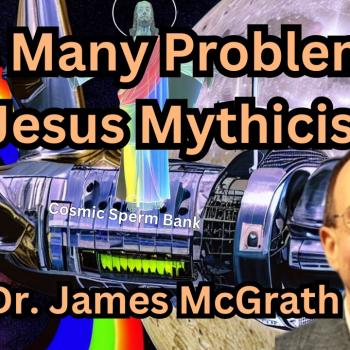I had been meaning to blog for a while about the question of whether it is worthwhile engaging with fringe views, whether those that are just barely represented within the academy, or those beyond its pale. It seems appropriate to return to the topic now, since Richard Carrier has offered two blog posts which react to my articles about his book in The Bible and Interpretation. The first one says, in summary, “You didn’t mention everything I said in my book about Gnosticism, and I hope my readers are gullible enough to believe that means you must be wrong about the things you did discuss.” The second is even more laughable, because Carrier writes:
You have to use my numbers. Because those are the numbers borne out by the facts. If you want to use different numbers, you’d better go find some different facts. Until you do, there is nothing left to discuss. The numbers are what they are. Cope.
Carrier, as anyone familiar with what he has written will know, is guilty of badly distorting the facts – whether about Jesus’ brother, or about what Paul writes about his descent from David, or anything else that doesn’t suit the “conclusion” that he has decided in advance he wants to reach.
In both blog posts, Carrier complains that I discussed the matter in mainstream historical terms, and not in the mathematical terms which he prefers. But since he is currently the only one who suggests that all historical arguments must be laid out in Bayesian terms, and since Carrier claims that any historical argument can be presented in Bayesian terms, he is free to rework arguments and interact with them in that way, but until such time as he persuades the field of history to adopt his preferred approach, it is unfair to complain that scholars aren’t doing it. In fact, it is interesting that the only people who seem to think that historical or pseudohistorical matters should be assessed in Bayesian terms are apologists: Richard Carrier, and William Lane Craig.
I think these blog posts of his provide evidence that engaging with fringe views is indeed useful – not, in many instances, those who dogmatically adhere to such views, but at least in showing that the holders of fringe views, while they often attempt to get things published in scholarly venues in order to make themselves and their views seem more plausible to the general public, in fact have no sincere interest in the kind of scholarly engagement that the academy demands.
Since some readers of this blog complain when I make comparisons between mythicism and other fringe viewpoints, I should point out that one can see the same exact approach Carrier uses on Intelligent Design blogs like Uncommon Descent. There’s the accusation that critics have not even read the works they discuss. And there’s the attempt to use formal logic not to make the argument more sound, but to make it seem more impressive to a public that doesn’t grasp the evidence and issues.
Of related interest, Paul Braterman and Jerry Coyne blogged about not engaging with creationism, and Daniel Gullotta blogged about whether or not to engage the Christ myth viewpoint. BoingBoing and Rebecca Trotter had pieces about creationism as well. An article also appeared about whether climate scientists should present their views to lawmakers. The Washington Post suggested that science teachers inadvertently undermine acceptance of evolution through the way they present things. Age of Rocks offered a wonderful analogy of how denialists use doubt.
Ken Perrott blogged about debating with anti-science activists, and the problems of getting accurate scientific information out via social media, because of the insularity of networking among people and groups that reject science.
What are blog readers’ thoughts on this topic? Obviously one can try to address all the major claims of fringe views, but one cannot try to answer every blog post that seeks to do damage control or spin things. Is there a happy medium, and if so, what is it? How have you seen fringe views about science, history, or other subjects addressed effectively and ineffectively on the internet?













